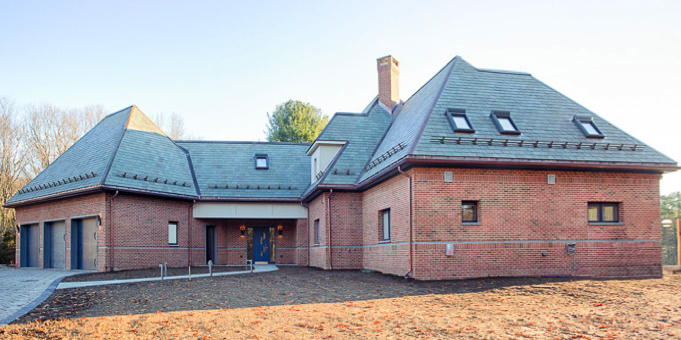Depending on construction methods and materials, old and new buildings alike can act as leaky buckets, where heat seeps out and energy costs are high. However, some local construction industry and environmental leaders say a “Passive House,” by contrast, is tightly sealed so only a small amount of energy is needed to ensure comfort while utility bills plummet.
In fact, Nick Falkoff, Dan Ruben and Aaron Gunderson want Newton residents to know Passive Houses actively save building owners money while helping the environment due to innovative construction principles, materials and design.
Ruben, chairman of Green Newton; Gunderson, executive director for Passive House Massachusetts (PHM); and Falkoff, owner of Auburndale Builders, recently gathered at the first Passive House-certified commercial retrofit building in Newton – Falkoff’s office – located at 151R Adams St., to explain why this type of construction may be the standard in the near future.
According to PHM, “Passive House significantly reduces the carbon footprint of a home while making a comfortable, healthy, and affordable environment.”
“This is the way the world is going,” said Ruben.
“I believe in climate change,” said Falkoff, a PHM board member. “Passive House makes a lot of sense if you’re trying to reduce carbon emissions.”
What is a Passive House?
Passive House, originally developed in Germany, refers to any building (not just homes) that is airtight with a mechanical ventilation system run by electricity. These buildings also have high-performance windows and doors. There are slightly different standards for new construction and renovations in existing buildings.
“The resulting performance produces approximately a 90 percent reduction in heating and cooling energy usage and up to a 75 percent reduction in primary energy usage compared to homes built to conventional building code,” according to PHM.
Because “these buildings use very little energy,” there’s a significant saving on utility bills, said Gunderson.
Central air conditioning is part of the electric heat pump system keeping the building comfortable.
One of Green Newton’s building principles is to encourage new construction to be off the natural gas grid, although this is not a requirement for Passive Houses. Ruben said this is a goal because the electric grid is getting cleaner each year thanks to renewable, while gas is not. Green Newton would like officials to make these building principles part of the city’s Climate Action Plan.
Goals for the future
Working at his company Auburndale Builders, Falkoff created his first Passive House in Wayland. The clients paid for him to learn on the job since the owners wanted the most cutting-edge home.
“Everyone on the [company] team had to get an education on how to do this,” he said. More builders need to be trained and certified to know how to build passive buildings and do better than current standards, he said.
“The building code has long been a follower and not a leader of best practices in sustainable building,” according to PHM.
In fact, Falkoff said that the building code is the “worst we can legally build to. … We have to exceed the building codes.”
Passive House construction is a stepping stone to net zero buildings, he said.
When it was time to move his business to a new home, he decided to create what he would learn is the first Passive House-certified commercial retrofit building in Newton. Inside, the Studio for High-Performance Design and Construction (StudioHPDC) occupies one end of the newly renovated office. StudioHPDC is “a classroom and educational center for sustainable design and construction,” according to its website. Here, builders, homeowners and developers who care about green buildings can learn more about the principles of Passive House.
When asked what the biggest challenge is about Passive House, Ruben said, “You have to learn a different way of building … you have to be willing to change.”
“We have to do this,” said Gunderson. “I think it will become the norm.”
To learn more:
- On May 30 from 6-7:30pm, Auburndale Builders will be hosting a workshop entitled, “Passive House 101 for Home Owners Considering New Home Construction or Renovation.” The event will be held at StudioHPDC (151R Adams St., Newton). This introductory workshop for homeowners and others with an interest in energy-efficient homes will provide an overview of the Passive House standard, design considerations, costs/savings, benefits, and construction process. Admission is free. RSVP through Eventbrite at studiohpdc.com/events
- For more information on Green Newton, visit greennewton.org/
- For more information on Passive House Massachusetts, visit phmass.org/
- For more information on the Studio for High-Performance Design + Construction, visit studiohpdc.com/
The above article, by Julie M. Cohen, appeared in the Newton TAB on May 15, 2019.


Recently on Twitter